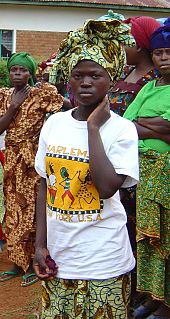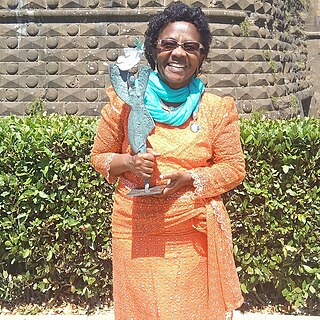Related Research Articles

The Democratic Republic of the Congo, also known as Congo-Kinshasa, DR Congo, the DRC, the DROC, or the Congo, and formerly Zaire, is a country in Central Africa. It is, by area, the second largest country in Africa, and the 11th-largest in the world. With a population of around 105 million, the Democratic Republic of the Congo is the most populous officialy Francophone country in the world. It is a member of the United Nations, Non-Aligned Movement, African Union, and COMESA. Since 2015, the Eastern DR Congo has been the site of an ongoing military conflict in Kivu. The capital and largest city is Kinshasa, who is also the world's most populous francophone city in the world.

South Kivu is one of 26 provinces of the Democratic Republic of the Congo. Its capital is Bukavu.

Ignace Murwanashyaka was a leader of the Democratic Forces for the Liberation of Rwanda (FDLR), a Rwandan Hutu rebel group that absorbed a number of military people responsible for the Rwanda genocide, and operating in the Democratic Republic of the Congo. The FDLR are responsible for large scale human rights violations and crimes against humanity, including rape on a massive scale.

Law enforcement in the Democratic Republic of the Congo has historically been focused on furthering the state's aims with no regard for human rights. The Police nationale congolaise is the police throughout the territory of the Democratic Republic of the Congo. It was composed of between 110,000 – 150,000 officers as of 2010.

Women in the Democratic Republic of the Congo have not attained a position of full equality with men, with their struggle continuing to this day. Although the Mobutu regime paid lip service to the important role of women in society, and although women enjoy some legal rights, custom and legal constraints still limit their opportunities.

Denis Mukwege is a Congolese gynecologist and Pentecostal pastor. He founded and works in Panzi Hospital in Bukavu, where he specializes in the treatment of women who have been raped by armed rebels.

The Democratic Republic of the Congo, and the east of the country in particular, has been described as the "Rape Capital of the World," and the prevalence and intensity of all forms of sexual violence has been described as the worst in the world. Human Rights Watch defines sexual violence as "an act of a sexual nature by force, or by threat of force or coercion," and rape as "a form of sexual violence during which the body of a person is invaded, resulting in penetration, however slight, of any part of the body of the victim, with a sexual organ, or of the anal or genital opening of the victim with any object or other part of the body."
The Democratic Republic of the Congo is a country located in central Africa.
Since the December 2010 revolution in Tunisia and protests across the Middle East and North Africa (MENA) began, Tunisian women have played an unprecedented part in the protests. Habib Bourguiba began instituting secular freedoms for women in 1956, such as access to higher education, the right to file for divorce, and certain job opportunities. Women in Tunisia enjoy certain freedoms and rights that are denied to women in neighboring countries, although the social norms have shifted since 2011.
Justine Masika Bihamba is a Congolese activist. As coordinator of Synergy of Women for Victims of Sexual Violence, she works to improve the lives of rural women, defend human rights and assist victims of war, especially women survivors of acts of sexual violence. This work is focussed in the province of North Kivu, and she has also campaigned for justice more widely in the Democratic Republic of Congo (DRC). She has won considerable international recognition for her achievements. She has on several occasions been subject to threats of arrest or death.

Bineta Diop is a Senegalese women's rights activist. She is the founder of Femmes Africa Solidarité, a non-profit organization which promotes women's rights in Africa.
Nelly Mbangu is a Congolese women's and children's rights campaigner. She has been involved in many non-governmental organisations in this field and co-founded a movement to bring together 30 organisations with similar aims. She is a woman human rights defender and the coordinator of the Help and Action for Piece - Aide et Action pour la Paix (AAP). Additionally Help and Action for Piece - Aide et Action pour la Paix (AAP) works on good governance topics, conflict resolution of land rights disputes. Those issues often affect women, for this reason Help and Action for piece links these topics together to positively impact the human rights situation in locally.
Solange Lwashiga Furaha is a human and women's rights activist from the Democratic Republic of the Congo, and the executive secretary of the South Kivu Congolese Women's Caucus for Peace.
Mathilde Muhindo Mwamini is the Director of the Olame Centre, Democratic Republic of Congo. She is a former member of the Parliament in the Democratic Republic of Congo. She was awarded the Human Rights Watch's Alison Des Forges Award for Extraordinary Activism. She and her organisation fight against discrimination and sexual violence against women.

Katana Gégé Bukuru is a Congolese activist fighting for women rights. She is also the founder of the SOFAD.
The Wassila network or l'Association contre les violences faites aux femmes et aux enfants or Avife is a network of Algerian citizens' groups and institutions that defend women's rights, established in October 2000.

Actualite.cd is a Congolese media website specializing in political, security and economic information. Its was launched in 2016 as part of Groupe Next Corp.
Nothing Without Women is a feminist organization established in the Democratic Republic of the Congo in 2015.
The Fifty Percent Women or Nothing Dynamic is a campaigning group based in South Kivu, uniting several civil society women's organizations in the Democratic Republic of the Congo. The group calls for full implementation of Article 14 of the Constitution, which guarantees gender parity in the management of public affairs at national, provincial and local level.
References
- ↑ "Nelly Mbangu". Fonds pour les Femmes Congolaises. Archived from the original on 8 August 2018. Retrieved 28 November 2017.
- ↑ McCrummen, Stephanie (9 September 2007). "Prevalence of Rape in E. Congo Described as Worst in World". The Washington Post. Retrieved 28 November 2017.
- ↑ "Dynamique des femmes jurists". Dynamique des femmes jurists. Retrieved 28 November 2017.
- ↑ "She is a humanitarian". Care International. Retrieved 28 November 2017.